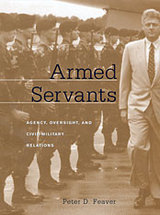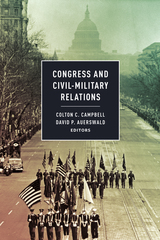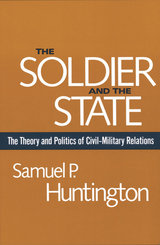
How do civilians control the military? In the wake of September 11, the renewed presence of national security in everyday life has made this question all the more pressing. In this book, Peter Feaver proposes an ambitious new theory that treats civil-military relations as a principal-agent relationship, with the civilian executive monitoring the actions of military agents, the "armed servants" of the nation-state. Military obedience is not automatic but depends on strategic calculations of whether civilians will catch and punish misbehavior.
This model challenges Samuel Huntington's professionalism-based model of civil-military relations, and provides an innovative way of making sense of the U.S. Cold War and post-Cold War experience--especially the distinctively stormy civil-military relations of the Clinton era. In the decade after the Cold War ended, civilians and the military had a variety of run-ins over whether and how to use military force. These episodes, as interpreted by agency theory, contradict the conventional wisdom that civil-military relations matter only if there is risk of a coup. On the contrary, military professionalism does not by itself ensure unchallenged civilian authority. As Feaver argues, agency theory offers the best foundation for thinking about relations between military and civilian leaders, now and in the future.


While the president is the commander in chief, the US Congress plays a critical and underappreciated role in civil-military relations—the relationship between the armed forces and the civilian leadership that commands it. This unique book edited by Colton C. Campbell and David P. Auerswald will help readers better understand the role of Congress in military affairs and national and international security policy. Contributors include the most experienced scholars in the field as well as practitioners and innovative new voices, all delving into the ways Congress attempts to direct the military.
This book explores four tools in particular that play a key role in congressional action: the selection of military officers, delegation of authority to the military, oversight of the military branches, and the establishment of incentives—both positive and negative—to encourage appropriate military behavior. The contributors explore the obstacles and pressures faced by legislators including the necessity of balancing national concerns and local interests, partisan and intraparty differences, budgetary constraints, the military's traditional resistance to change, and an ongoing lack of foreign policy consensus at the national level. Yet, despite the considerable barriers, Congress influences policy on everything from closing bases to drone warfare to acquisitions.
A groundbreaking study, Congress and Civil-Military Relations points the way forward in analyzing an overlooked yet fundamental government relationship.

Between the two World Wars, particularly in the 1930s, the relations between the French civilian government and the Army went through a series of devastating changes. These turbulent developments culminated in the refusal of the Army’s leaders to obey their civilian superiors during the catastrophe of June 1940, the first such insubordination in modern French republican history. The author examines every aspect of this disastrous process, pursuing his analysis largely through the activities and thought of General Maxime Weygand, who, although deeply affected by the loss of civil–military trust, contributed importantly to it and eventually led the Army in its disobedience.
Philip Bankwitz finds the seeds of the disaffection between the French civilian authorities and the military in a variety of interconnected elements. During the early 1930s, for example, the soldiers became convinced that the Government’s policies concerning service time, military appropriations, and disarmament were pushing the Army to the brink of ruin. The Third Republic was highly unstable politically, as was shockingly demonstrated in February 1934 when the Government leaders resigned in the face of violent disorders in Paris attendant on the Stavisky Affair which climaxed two years of internal strife. Among soldiers, aware of the Government’s weakness, suspicious of its alleged antimilitarism, and fearful of the approaching conflict with Nazi Germany, there was a growing and almost unconscious tendency to think in terms of the possible need to extend the protection of the Army to the nation in its difficulties. In this way, important elements in the officer corps began, psychologically and emotionally, “to prepare for eventual intervention in national political affairs.”
General Weygand, whom the author interviewed on numerous occasions, held the personal conviction that the distrust between the civilian and military establishments was the root cause of French defeat. Mr. Bankwitz is convinced that this opinion of Weygand’s is possibly the single most important clue to the puzzling connection between the civil–military relationship and the collapse of June 1940. Granting all the other factors contributing to the defeat, it would be impossible to exaggerate the historical importance of Weygand’s disobedience—an act which also opened the way for later military saviors and for the ascendant role of the Army in French politics.
This is the first scholarly study in depth of the crucial prewar phase of the French army’s development into a disruptive force in national life. A chapter from the portentous twentieth-century story of the soldier in politics, it has relevance now to situations already formed or forming in other western societies. The value of the book is greatly enhanced by an encyclopedic bibliography of writing on French political history in this century.

In a classic work, Samuel P. Huntington challenges most of the old assumptions and ideas on the role of the military in society. Stressing the value of the military outlook for American national policy, Huntington has performed the distinctive task of developing a general theory of civil–military relations and subjecting it to rigorous historical analysis.
Part One presents the general theory of the "military profession," the "military mind," and civilian control. Huntington analyzes the rise of the military profession in western Europe in the eighteenth and nineteenth centuries, and compares the civil–military relations of Germany and Japan between 1870 and 1945.
Part Two describes the two environmental constants of American civil–military relations, our liberal values and our conservative constitution, and then analyzes the evolution of American civil–military relations from 1789 down to 1940, focusing upon the emergence of the American military profession and the impact upon it of intellectual and political currents.
Huntington describes the revolution in American civil–military relations which took place during World War II when the military emerged from their shell, assumed the leadership of the war, and adopted the attitudes of a liberal society. Part Three continues with an analysis of the problems of American civil–military relations in the era of World War II and the Korean War: the political roles of the Joint Chiefs of Staff, the difference in civil–military relations between the Truman and Eisenhower administrations, the role of Congress, and the organization and functioning of the Department of Defense. Huntington concludes that Americans should reassess their liberal values on the basis of a new understanding of the conservative realism of the professional military men.
READERS
Browse our collection.
PUBLISHERS
See BiblioVault's publisher services.
STUDENT SERVICES
Files for college accessibility offices.
UChicago Accessibility Resources
home | accessibility | search | about | contact us
BiblioVault ® 2001 - 2025
The University of Chicago Press









